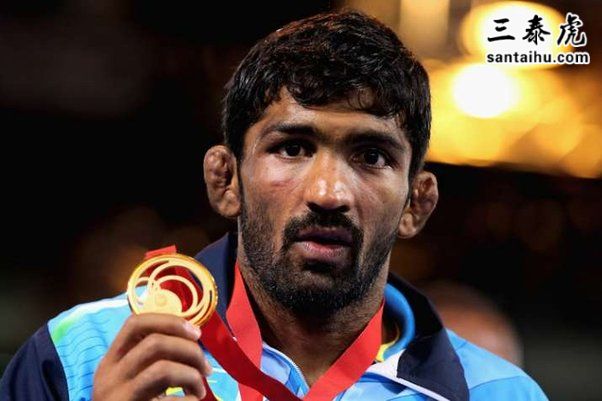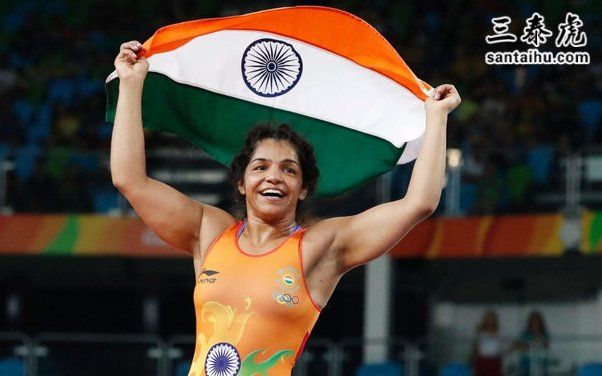Why does India never win medals at the Olympic Games? Is it because most of Indians are vegetarians? (lack of proteins)
为什么印度从未在奥运会上赢得奖牌?是因为大多数印度人是素食主义者吗?
以下是Quora网友的评论:
Aman Sharma
Vegetarianism has a very less or perhaps zero role to play when wng a medal. There are bigger factors that exst for a country’s medal tally in an Olympics. Most of the Indian players come alone from Haryana and you might get surprised that it has the highest percentage of vegetarians among the Indian states. Seemingly it outright rejects the proportional relation between vegetarianism and Olympic medals.
对于能否赢得奖牌,素食主义的作用微乎其微,甚至可能压根没有影响。对于一个国家在奥运会奖牌榜上的排名,其实有别的更大的影响因素。大多数印度运动员都来自哈里亚纳邦,你可能会惊讶于这里的素食者比例是印度各邦中最高的。它似乎完全颠覆了素食主义和奥运奖牌之间的比例关系。
Moreover, the other Indian States like West Bengal, Orissa, Jharkhand, Bihar has 90 percent of the people eating non-veg and the only notable Olympic winner is Leander Paes. If you dig into north eastern states they also have higher percentage of non-veg eaters and also produced great Woman olympic winners namely Mary Kom, Mirabai Chanu, Lovlina Borgohain, but their success in my opinion is not because a larger population eating meat but rather society’s support for the girl child to pursue sports.
此外,印度其他邦,如西孟加拉邦、奥里萨邦、贾坎德邦、比哈尔邦,大概有90%的人都不是素食主义者,但只有一个奥运冠军利安德德·帕斯。如果你深入研究东北各邦的情况,会发现非素食者的比例也更高,出现了伟大的女性奥运冠军,如玛丽·科姆、米拉拜·查努、洛芙琳娜·博尔戈哈因,但在我看来,她们的成功不是因为吃肉的人更多,而是当地社会对女孩从事体育项目的支持。
Now having a global outlook Pakistan, Afghanistan have a very small population of vegetarians and to your surprise they have also managed to win very few medals. How I see it is, the more developed the country is, the more emphasis they can give to the Olympics. That’s the reason why most of the first world countries top the list, some of the exception being China. They consider Olympics as a stage to flaunt just as Elephants has two sets of teeth for flaunting and eating and as a non-de ocratic country they can do it by pipelining more funds to sports infrastructure.
现在再用全球视角看看,巴基斯坦和阿富汗的素食人口非常少,但他们的奥运奖牌也不多。在我看来,一个国家越发达,就越重视奥运会。这就是大多数第一世界国家都能名列榜首的原因,只有中国例外。中国认为奥运会是一个炫耀的舞台,就像大象用两副牙齿分别用来炫耀和进食一样,作为一个非皿煮国家,中国通过向体育基础设施投入更多资金来取得更好的成绩。
The develo countries like India has much bigger problems to focus like hunger, malnutrition poverty, unemployment and so as many countries in the global south. In India’s case Medals are consequence of shear individual brilliance and the government plays a very minor role. On the other side the developed countries have a well settled infrastructure for sports and they don’t have to deal with common third-world issues.
而印度这样的发展中国家还面临着更大的问题,比如饥饿、营养不良、贫困、失业等。在印度,奖牌是个人杰出表现的结果,政府发挥的作用很小。另一方面,发达国家有完善的体育基础设施,他们不需要烦心第三世界国家面对的棘手问题。
Tejash
India has won medals at the Olympic Games in the past, and it is not accurate to say that India never wins medals. In fact, India has won a total of 28 medals in the Olympics, including 9 gold medals. There are a number of factors that can influence a country's success at the Olympic Games, and it is not accurate to attribute it to a single factor such as the diet of the country's population. Factors such as the level of investment in sports infrastructure, the availability of coaching and training facilities, and the number of athletes representing the country can all play a role in a country's success at the Olympics. It is also important to note that the Olympic Games feature a wide range of sports, and it is not uncommon for countries to excel in certain sports while not doing as well in others.
印度在奥运会上是拿过奖牌的,所以说印度从未获得奖牌的说法是不准确的。事实上,印度在奥运会上总共获得过28枚奖牌,其中包括9枚金牌。有许多因素可以影响一个国家在奥运会上的表现,将结果归因于某个因素(比如该国人口的饮食习惯)是不准确的。对体育基础设施的投资、教练和训练设施的资源以及参加奥运会的运动员数量等因素都会影响一个国家的奥运会成绩。同时我们也要注意,奥运会的特点是项目非常多,有些国家在某些项目上表现出色,在其他项目上表现不佳。
Sriram Subramanian
It is not accurate to say that India "never" wins medals at the Olympic Games, or to attribute India's Olympic performance solely to the fact that many Indians are vegetarians. While it is true that India has won relatively few medals at the Olympics compared to some other countries, this is not necessarily due to any inherent disadvantage or deficiency on the part of Indian athletes.
说印度“从未”在奥运会上赢得奖牌,或者把印度在奥运会上的表现单纯归因于多数印度人是素食主义者,这些说法都不准确。虽然和其他一些国家相比,印度在奥运会上获得的奖牌较少,但这并不一定是因为印度运动员存在先天不足或缺陷。
There are a variety of factors that can influence a country's performance at the Olympics, and these factors can vary significantly from one country to another. Some of the factors that can impact a country's Olympic medal count include the level of investment in sports and athlete development, the availability of training facilities and resources, and the overall wealth and prosperity of the country.
许多因素都会影响一个国家的奥运会成绩,而这些因素可能因国家而异。影响一个国家奥运奖牌数的一些因素包括该国为鼓励体育项目和运动员的进步而作出的投资,训练设施和相关资源的多寡,以及国家的整体经济实力。
Hulakhu Khan
India has won several olympic medals in boxng and wrestling, male and female
These people, come from Haryana, near Delhi
印度在男子和女子拳击和摔跤项目上赢得过几枚奥运奖牌
这些运动员来自德里附近的哈里亚纳邦

They are mostly Jats, They are obligate vegetarians
他们大多是贾特人,是严格的素食主义者

About 10% of the Indian Army is Hindu Jats, who are vegetarian
They get their protein from milk
vs groups like Bengalis are 99% meat eaters, and will never win an Olympic medal
他们从牛奶中获取蛋白质
而孟加拉人等群体中99%都是肉食者,永远都拿不到奥运奖牌
Dr. Balaji Viswanathan
India has won just 7 medals in the last Olympics which is low [32 countries did better].
However, that has nothing to do with Indian diet or being Vegetarians.
For instance, nearly 100% of Pakistan is made of meat-eaters and they won 0 medals in the last 7 Olympics. Afghans tend to be bigger and stronger. They are also meat eaters and they got 0 in the last few decades. Sri Lankans tend to eat more fish and they won nothing either. Same case with other south Asian countries. In fact, India tends to dominate the South Asian sports whatever that is worth. Thus, vegetarianism is not its weakness.
印度在上届奥运会上只赢得了7枚奖牌,表现不佳[有32个国家的成绩比印度好]。
但这跟印度的饮食结构或素食主义并没有关系。
例如,几乎100%的巴基斯坦人都是肉食者,但他们在过去的7届奥运会上都没能实现奖牌零突破。阿富汗人的体格更高更壮。他们也是肉食者,在过去的几十年里他们什么奖牌也没拿到过。斯里兰卡人喜欢吃鱼,他们也没拿到过奖牌。其他南亚国家也都是如此。事实上,印度在南亚体育界已经是翘楚了。所以素食主义并不是症结所在。
We will move to another region. Maybe it is a regional thing. Indonesia got 5, Mexco 4, Malaysia/Philipines/Argentina/Nigeria 2, South Africa 3.
Take any major develo country — regardless of whatever they eat, they are likely to score low.
我们再看看其他地区,也许这是地域问题。印度尼西亚拿了5枚奖牌,墨西哥4枚,马来西亚/菲律宾/阿根廷/尼日利亚各2枚,南非3枚。
以这几个较大的发展中国家为例—不管他们吃什么,他们的成绩可能都不太理想。
The most important determinant of Olympic medal count is wealth. Without wealth, poor Afghans or Nigerians or Indians are not going to score much. In fact, India has improved its performance in a lot of games in the last 2 decades, only with prosperity. But, we have a long way to go. You could see such a drastic change in South Korea. Before 1984 they were a very small sporting power, but in 1980s they got rich fast, and so did their medal counts.
Of course, there are exceptions. There are 4 (out of 150) develo countries that do well in Olympics — China, Brazil, Jamaica and Kenya.
对奥运会奖牌数而言,最具决定性的因素是国家财富。没有经济实力,贫穷的阿富汗人、尼日利亚人或印度人的成绩都不理想。
事实上,在过去20年里,印度在很多比赛中的表现已经有所提高,原因就是经济实力逐步提升。但我们还有很长的路要走。
韩国就发生了非常巨大的变化。在1984年之前,韩国只是一个非常小的体育强国,但在20世纪80年代,韩国经济迅速崛起,奖牌数量也逐步增加。
当然,事情也会有例外。在全球150个国家中,有4个发展中国家在奥运会上表现非常出色—中国、巴西、牙买加和肯尼亚。
In case of Jamaica and Kenya, there is a genetic trait that is found in a small population group that makes them excellent runners. This probably came out of a mutation a long time ago. First came in Kenya and then exported to the Caribbean.
China and Brazil are develo countries that have invested a lot on sporting infrastructure & success [China hosting the games in 2008 and Brazil in 2016]. That is a kind of infra most develo countries don’t have.
以牙买加和肯尼亚为例,人们在一小部分人群中发现了一种遗传特征,他们成了非常优秀的赛跑运动员。这种遗传可能源自很久以前的突变。有跑步天赋的人首先出现在肯尼亚,然后迁徙到了加勒比地区。
中国和巴西都是发展中国家,它们在体育基础设施方面投入了大量资金(中国举办了2008年奥运会,巴西举办了2016年奥运会)。而大多数发展中国家都缺乏体育基础设施。
During the Cold War, sports was used as a proxy battle ground. Thus, both USA-led group and the USSR-led group spent a lot of effort grooming athletes and put high level energy in wng medals. You can still find the ex-Soviet bloc countries such as Cuba and Hungary punching above their weight.
For groups not aligned with these 2 battling countries, not as much priority was given to medals.
冷战期间,体育就是各国较劲的战场。美国和苏联都花了很多精力培养运动员,为争夺奖牌投入了很大的精力。古巴和匈牙利等前苏联集团国家如今为奥运会还是不惜余力。
而对于那些没有跟美国和苏联结盟的国家,奖牌的重要性并没有那么高。
Pravinchandra G Dhameliya
There are two misconceptions in your question.
Around 70 % or more indians are Non vegetarian.
Even fully vegetarian indians uses milk and milk products.
Again in India we use too much daal or beans that is very good source of protein as well.
Recently we have started to win medals at Olympic. We have shooting , weighlifting, jewelin throw medals.
In common wealth and Asian games we have more medals.
你的问题存在两个误区。
大约70%或更多的印度人是非素食主义者。
即使是完全素食的印度人也会喝牛奶,吃其他奶制品。
我们印度人会吃很多豆角或豆类,它们也是很好的蛋白质来源。
近年来我们也开始在奥运会上斩获奖牌了,比如射击、举重等。
印度在英联邦和亚运会上获得的奖牌就更多了。
Krishnan Unni Madathil
India has underinvested in individual sports in general. However, in the last Olympics, the Indian contingent fielded its largest ever group and secured by far the largest medal tally in its own history.
The vegetarian theory for underperformance has been debunked. If it were true, the. countries which swear by meat consumption and at a similar income level as India’s, such as Pakistan, would have been running rings round India in terms of performance at the Olympics. We don’t see that happening.
总的来说,印度在体育项目上的投资不够多。但上一届奥运会印度代表团派出了有史以来最庞大的运动员队伍,并获得了印度历史上最多的奖牌。
素食影响奥运会成绩的说法已经被揭穿了。如果真是事实,那么……那些以肉类为主食,收入水平与印度相似的国家,比如巴基斯坦,在奥运会上的表现就应该超过印度。但事实并非如此。
India’s poor performance is more to do with a lack of proper investment in training facilities and inadequate coaching. Like with most things Indian, poor management and guidance leads to poor results.
Contrast the Olympics performance of India with that of Britain, and the difference becomes clear. India and Britain had the same medals tally as each other in 1996. Twenty years later, Britain regularly comes in the top 5 in terms of medals and is the only country to have won more medals at an Olympics venue outside of its country immediately after hosting it. And British sport is increasingly health-conscious and is increasingly moving in the direction of non-meat protein for its athletes.
印度在奥运赛场上的糟糕表现更多地与训练设施匮乏,投资和教练不足有关。印度的大多数事情都是如此,糟糕的管理和指导只能导致糟糕的结果。
对比一下印度和英国在奥运会上的表现,差别就很明显了。1996年,印度和英国的奖牌数相同。20年后,英国已经在奖牌榜上稳居前五,是唯一一个在举办奥运会后立即在国外获得更多奖牌的国家。英国体育界越来越注重运动员的健康,开始向为运动员提供非肉类蛋白质的方向发展。
Most inspiring is the US, which regularly tops the medals tally, and regularly sends the largest contingent of sportspersons to every Olympics event; and all that without an official government sports program, it runs almost entirely on private donations and sponsorships. And delivers the best results.
最鼓舞人心的是美国,它经常在奖牌榜上名列前茅,而且每届奥运会派出的运动员队伍都是最多的。而且美国没有官方的政府体育项目,它几乎完全依靠私人捐赠和赞助。但美国依然取得了最好的成绩。
此文由 三泰虎 编辑,未经允许不得转载!:首页 > 资讯 » 为什么印度从未在奥运会上赢得奖牌,是因为大多数印度人是素食主义者吗
 这位印度女孩讨论中印在2024年巴黎奥运会上的表现
这位印度女孩讨论中印在2024年巴黎奥运会上的表现 为什么印度在奥运会上表现不如中国
为什么印度在奥运会上表现不如中国 巴黎奥运会:印度以微弱差距失去五枚奖牌
巴黎奥运会:印度以微弱差距失去五枚奖牌 巴黎奥运会金牌榜,美国已经大大缩小了差距,会很快超越中国吗
巴黎奥运会金牌榜,美国已经大大缩小了差距,会很快超越中国吗 历史性胜利!郑钦文战胜克罗地亚选手维基奇,摘得巴黎奥运会网球女单金牌
历史性胜利!郑钦文战胜克罗地亚选手维基奇,摘得巴黎奥运会网球女单金牌 印度3枚奖牌了,Swapnil Kusale在男子50米步枪3姿射击比赛获得一枚铜牌,印网民沮丧:比赛已进行7天,照这样下去印度这次拿不到两位数奖牌
印度3枚奖牌了,Swapnil Kusale在男子50米步枪3姿射击比赛获得一枚铜牌,印网民沮丧:比赛已进行7天,照这样下去印度这次拿不到两位数奖牌 为什么印度足球这么烂,在奥运会上拿不到奖牌
为什么印度足球这么烂,在奥运会上拿不到奖牌 打破世界纪录,中国选手潘展乐夺得巴黎奥运会男子100米自由泳金牌
打破世界纪录,中国选手潘展乐夺得巴黎奥运会男子100米自由泳金牌